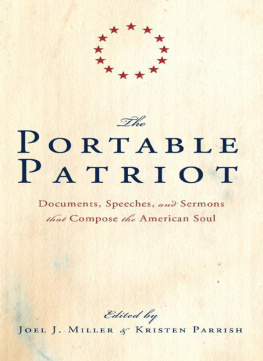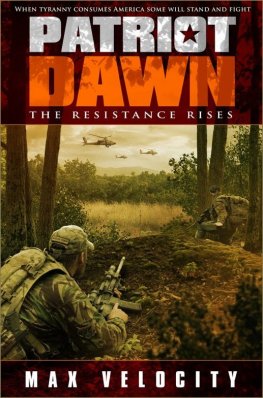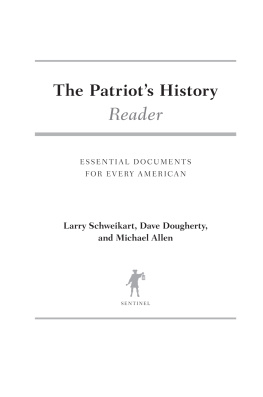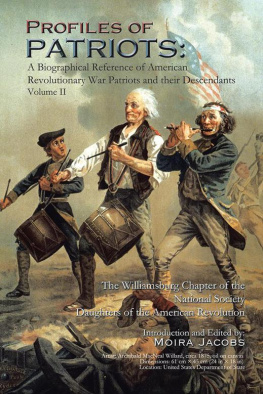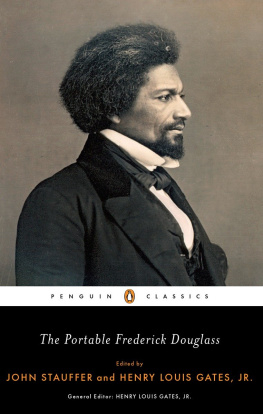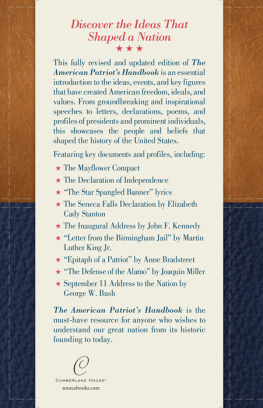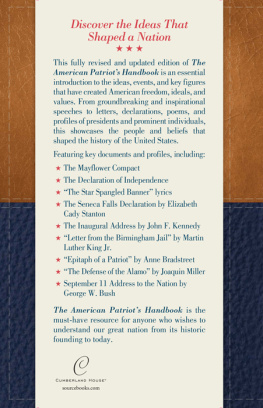
The
PORTABLE
PATRIOT
The
PORTABLE
PATRIOT
Documents, Speeches, and
Sermons That Compose
the American Soul
Edited by
JOEL J. MILLER & KRISTEN PARRISH

2010 by Joel J. Miller and Kristen Parrish
All rights reserved. No portion of this book may be reproduced, stored in a retrieval system, or transmitted in any form or by any meanselectronic, mechanical, photocopy, recording, scanning, or otherexcept for brief quotations in critical reviews or articles, without the prior written permission of the publisher.
Published in Nashville, Tennessee. Thomas Nelson is a registered trademark of Thomas Nelson, Inc.
Thomas Nelson, Inc., titles may be purchased in bulk for educational, business, fund-raising, or sales promotional use. For information, please e-mail SpecialMarkets@ThomasNelson.com.
Unless otherwise indicated, Scripture quotations are from the King James Version.
Library of Congress Cataloging-in-Publication Data
The portable patriot : documents, speeches, and sermons that compose the American soul / edited by Joel J. Miller and Kristen Parrish.
p. cm.
Includes bibliographical references and index.
ISBN 978-1-59555-110-8
1. United StatesPolitics and governmentTo 1775Sources. 2. United StatesPolitics and government17751783Sources. 3. United StatesPolitics and government17831809Sources. 4. Patriotism United StatesHistorySources. 5. Speeches, addresses, etc., American. 6. Sermons, American. I. Miller, Joel, 1975 II. Parrish, Kristen.
E173.P765 2010
973.3dc22
2010010627
10 11 12 13 WC 6 5 4 3 2 1
JOEL J. MILLER:
To my parents, Dennis and Karen Miller,
who gave me more than theyll ever know.
KRISTEN PARRISH:
To Ken and Mary Joyce, for instilling
in me a deep love of our nation.
And to my husband, Marc, for his patience and support.
It does not require a majority to prevail, but rather an irate,tireless minority keen to set brush fires in peoples minds.
SAMUEL ADAMS
CONTENTS
A PLACE, A PHILOSOPHY, AND A PEOPLE
The history of the first English settlements in America, and ofthe measures which prepared the way for a revolution in thecolonies, is too interesting not to be well understood by men ofcommon curiosity and reading.... That history unfolds aseries of great events, evidently suited to accomplish importantpurposes in the economy of Divine Providence... eventswhich every American of expanded views must contemplatewith admiration; and every Christian, with delight.
NOAH WEBSTER
W e all recognize that America is a place. Most will recognize that it is also a philosophy. Say it, hear it, read ithowever you encounter the word, America is inseparably attached to certain ideas and sentiments, values with which Americans generally identify.
Liberty, thrift, self-determination, public virtue, humility, courage, hard work, prayer, reliance on Godthe American philosophy is a molten amalgam of the dreams and aspirations of millions of disparate peoples. But in our foundational years, perhaps more than many others, it was the master wordsmiths and orators, the pastors, lawyers, and politicians who forged and molded those values and hopes into solid prose and soliloquies. From the Puritans to the founders, the American soul was forged in the smithy of the spoken word and printed page.
We are a nation rooted in the revolutionary oratory of men like Patrick Henry and the pamphletry of Thomas Paine, the fiery rhetoric of Samuel Adams and stirring sermonizing from the pens and pulpits of men like the Revs. Samuel Sewell and Jonathan Mayhew. The colonial Committees of Correspondence and newspapers circulated revolutionary ideas, while incendiary tracts by James Otis and others gave backbone and resolve to the colonists. All the while Ben Franklins wit shined and amused while it gave context and perspective.
Our reliance on the word goes back to the Pilgrims and the Mayflower Compact. It continues through the Declaration of Independence, the Articles of Confederation, the Constitution of the United States, and the Bill of Rights. It emerges in the political struggles of the Revolution and the ratification arguments of our national charter.
We find our identity in a mountain of words. ThePortable Patriot mines that mountain and makes the choicest and most valuable selections from essays, extracts, sermons, poems, songs, and speeches available and accessible to a wide range of readers.
It should be noted here that weve abridged most of these selections from the originals. This book is a little library of foundational documents. To include all of these selections in their entirety would have resulted in a book considerably less portable. If you would like the unabridged selections, weve cited where they can be found. Weve made some light edits for clarity but otherwise have left intact the idiosyncrasies of grammar and spelling common to the period.
WHATS BEHIND THIS COLLECTION?
Our motivation in assembling this collection is partly selfish. As Noah Webster said, people of common curiosity and reading ought to know this story, and being commonly curious readers, we surmised that it couldnt hurt to improve our knowledge and appreciation of the American story. What better way than through its foundational documents and speeches? As Webster indicated, we discovered a great deal to admire, and as Christians we also found the delight that Webster said would accompany our contemplations. What else could we do but share what wed found? Americans of any stripe should find passages that spark joy and stir the soul.
But more than our desire to learn and share, the balance of our motivation is to provoke. Our desire is to hold up the principles and values that make up the American philosophy and then pose a challenge, because America is not only a place on the map and collection of ideals. America is also a people. To say that America has its own peculiar philosophy is meaningless unless Americans act like it. Principles, philosophies, values, and virtues are all just empty abstractions until the moment that someone embodies them. We want to provoke more intentional embodiment of the ideals that compose the American soulin ourselves and others.
Christians believe that the single most important fact in history is the Incarnation and the bodily ministry of Christ on earth, culminating in his death and resurrection. Far from a vague cloud of ideals floating in the ether, the Word became flesh. Jesus Christ had a ministry. He acted. He served. This is the key to understanding such scriptural statements as faith without works is dead ( James 2:26). To be real and meaningful, principles need bones and blood; they need hands and feet.
These are not merely things that people of common curiosity and reading should contemplate with admiration and delight, though we believe these selections to be as enjoyable as they are edifying. But consider: These orators and writers lived real lives in function of their ideals. They labored, they struggled, they fought, some even gave their lives for the cause they upheld. Faith without works is dead, and politics without policies is a waste of time.
Our challenge comes in the form of a question:
If our selections reflect the American soul, what it really means to think, believe, and act like an American, then how do we measure up? It means nothing to have a heart swelling with patriotism if our hands are not manifesting the same.
Next page
